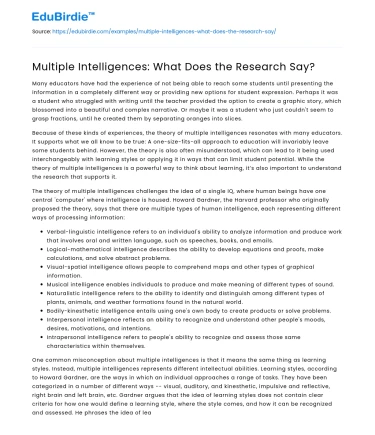Many educators have had the experience of not being able to reach some students until presenting the information in a completely different way or providing new options for student expression. Perhaps it was a student who struggled with writing until the teacher provided the option to create a graphic story, which blossomed into a beautiful and complex narrative. Or maybe it was a student who just couldn't seem to grasp fractions, until he created them by separating oranges into slices.
Because of these kinds of experiences, the theory of multiple intelligences resonates with many educators. It supports what we all know to be true: A one-size-fits-all approach to education will invariably leave some students behind. However, the theory is also often misunderstood, which can lead to it being used interchangeably with learning styles or applying it in ways that can limit student potential. While the theory of multiple intelligences is a powerful way to think about learning, it’s also important to understand the research that supports it.
Save your time!
We can take care of your essay
- Proper editing and formatting
- Free revision, title page, and bibliography
- Flexible prices and money-back guarantee
The theory of multiple intelligences challenges the idea of a single IQ, where human beings have one central 'computer' where intelligence is housed. Howard Gardner, the Harvard professor who originally proposed the theory, says that there are multiple types of human intelligence, each representing different ways of processing information:
- Verbal-linguistic intelligence refers to an individual's ability to analyze information and produce work that involves oral and written language, such as speeches, books, and emails.
- Logical-mathematical intelligence describes the ability to develop equations and proofs, make calculations, and solve abstract problems.
- Visual-spatial intelligence allows people to comprehend maps and other types of graphical information.
- Musical intelligence enables individuals to produce and make meaning of different types of sound.
- Naturalistic intelligence refers to the ability to identify and distinguish among different types of plants, animals, and weather formations found in the natural world.
- Bodily-kinesthetic intelligence entails using one's own body to create products or solve problems.
- Interpersonal intelligence reflects an ability to recognize and understand other people's moods, desires, motivations, and intentions.
- Intrapersonal intelligence refers to people's ability to recognize and assess those same characteristics within themselves.
One common misconception about multiple intelligences is that it means the same thing as learning styles. Instead, multiple intelligences represents different intellectual abilities. Learning styles, according to Howard Gardner, are the ways in which an individual approaches a range of tasks. They have been categorized in a number of different ways -- visual, auditory, and kinesthetic, impulsive and reflective, right brain and left brain, etc. Gardner argues that the idea of learning styles does not contain clear criteria for how one would define a learning style, where the style comes, and how it can be recognized and assessed. He phrases the idea of learning styles as 'a hypothesis of how an individual approaches a range of materials.'
Everyone has all eight types of the intelligences listed above at varying levels of aptitude -- perhaps even more that are still undiscovered -- and all learning experiences do not have to relate to a person's strongest area of intelligence. For example, if someone is skilled at learning new languages, it doesn’t necessarily mean that they prefer to learn through lectures. Someone with high visual-spatial intelligence, such as a skilled painter, may still benefit from using rhymes to remember information. Learning is fluid and complex, and it’s important to avoid labeling students as one type of learner. As Gardner states, 'When one has a thorough understanding of a topic, one can typically think of it in several ways.'
While additional research is still needed to determine the best measures for assessing and supporting a range of intelligences in schools, the theory has provided opportunities to broaden definitions of intelligence. As an educator, it is useful to think about the different ways that information can be presented. However, it is critical to not classify students as being specific types of learners nor as having an innate or fixed type of intelligence.






 Stuck on your essay?
Stuck on your essay?

